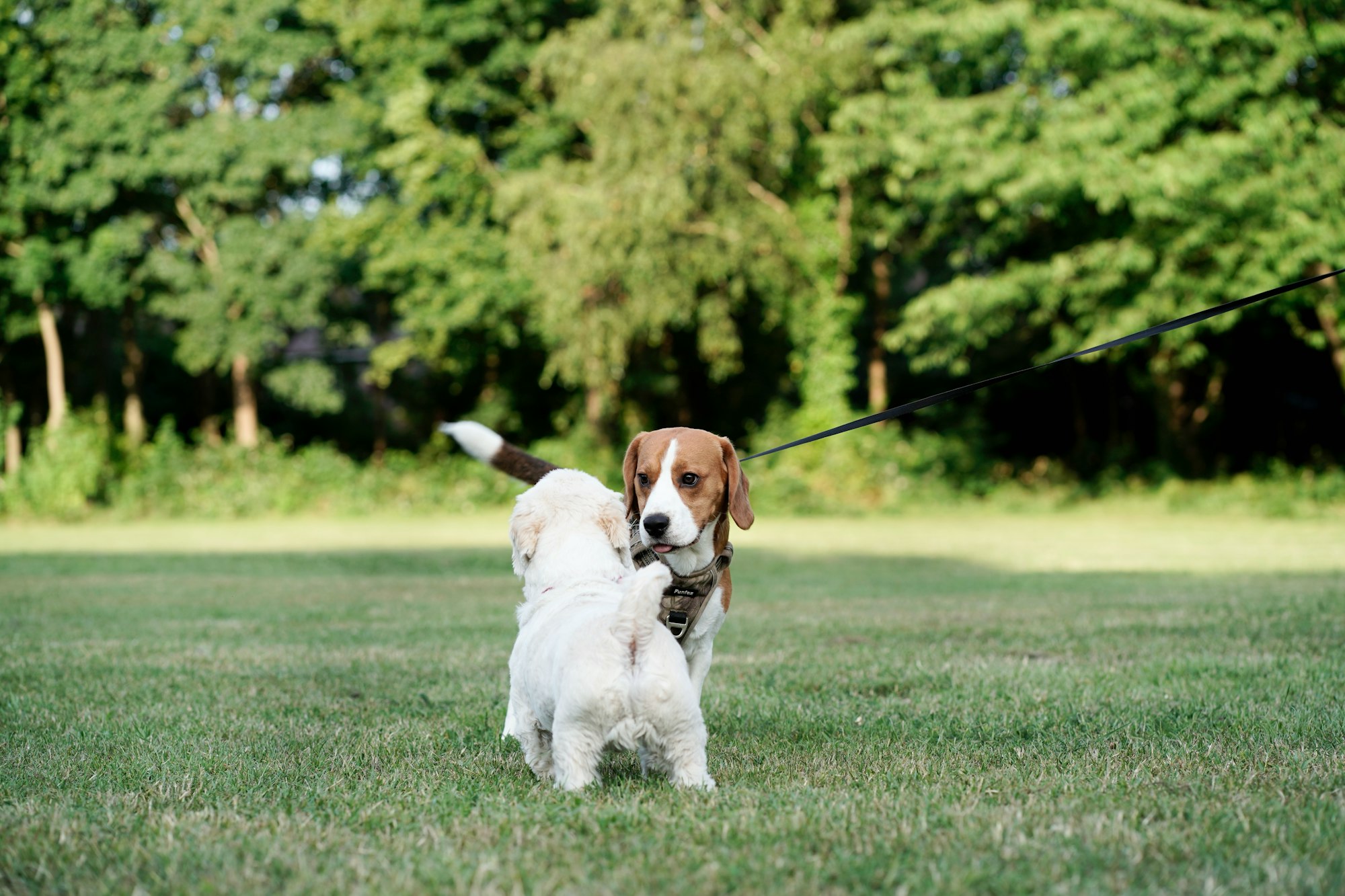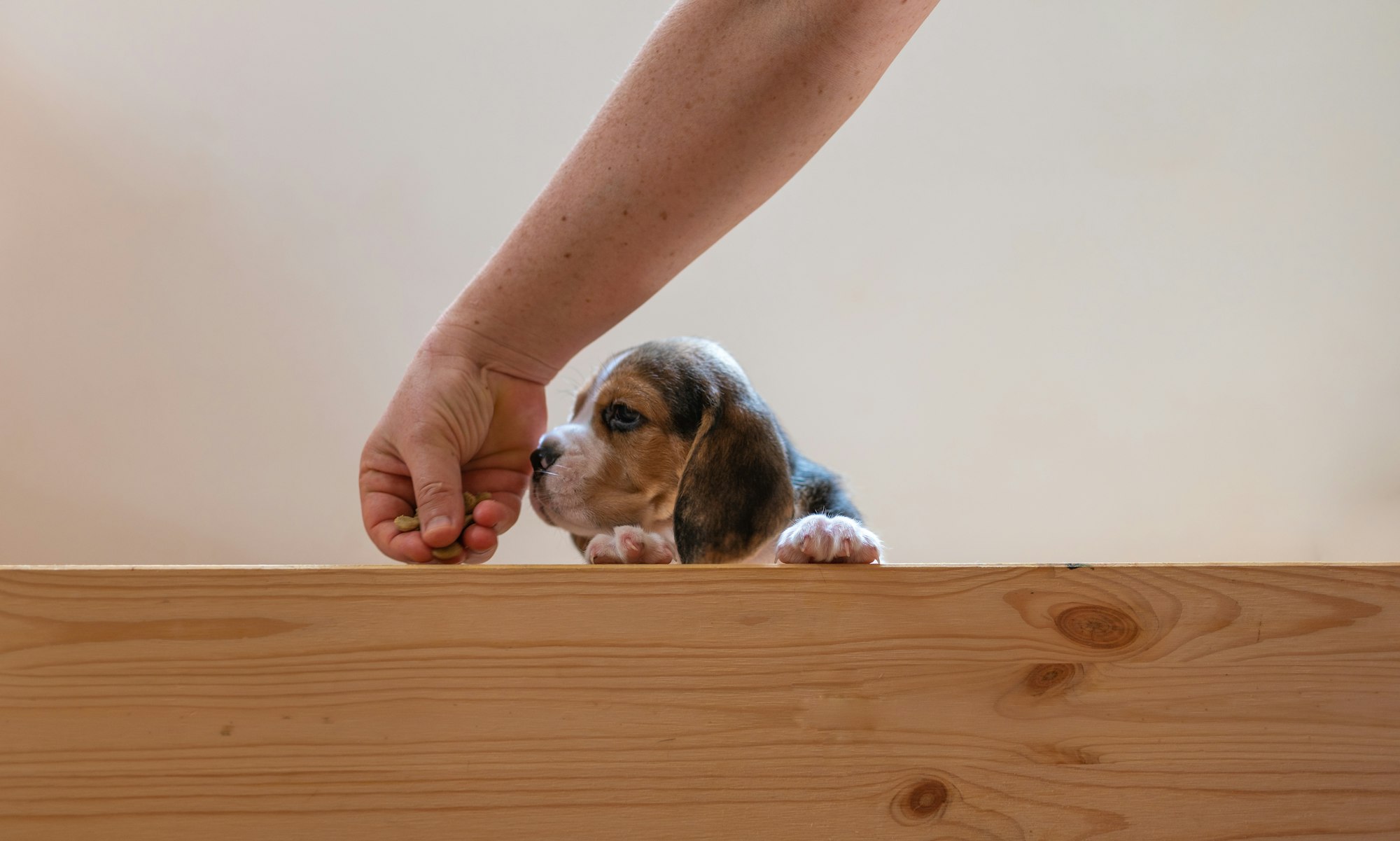Beagle puppies are known for their undeniable charm and playful nature. With their adorable appearance and friendly personality, they have captured the hearts of many dog lovers around the world. In this article, we will delve into the wonderful world of beagle puppies, exploring their characteristics, care requirements, and why they make fantastic companions.

The origin of beagle puppies can be traced back centuries ago to England. They were primarily bred for hunting purposes due to their exceptional scent-tracking abilities. Over time, their hunting skills were appreciated, and beagles gained popularity as family pets for their lovable and sociable nature.
Appearance and Size
Beagle puppies have a distinctive and charming appearance. They have a compact and muscular body with a sleek, short-haired coat. Their coat comes in multiple colors, including tricolor (black, white, and tan), red and white, lemon and white, or chocolate and white. Beagles have a friendly and intelligent expression with round, expressive eyes and long, droopy ears that add to their adorable appeal.
In terms of size, beagle puppies are considered a medium-sized breed. On average, adult beagles stand about 13 to 15 inches (33 to 38 cm) tall at the shoulder. They typically weigh between 20 to 30 pounds (9 to 14 kg), with males being slightly larger than females.
Temperament and Personality
Beagle puppies are known for their lovable and sociable nature. They are friendly, and outgoing, and enjoy being around people and other dogs. Their affectionate disposition makes them excellent family pets and great companions for individuals of all ages.
These puppies have a curious and adventurous spirit, always ready to explore their surroundings. They have a keen sense of smell, which can sometimes lead them to follow interesting scents without hesitation. It's necessary to provide them with a safe and secure environment to prevent them from wandering off.
Beagles are also known for their happy-go-lucky attitude and their ability to bring joy to any household. They have a playful nature and love engaging in various activities, whether it's playing fetch, going for walks, or participating in dog sports.
However, it's necessary to provide them with enough mental and physical stimulation to prevent boredom, as they can become mischievous if under-stimulated.

Exercise and Training
Beagle puppies are energetic and require regular exercise to keep them physically fit and mentally stimulated. They have a lot of stamina and enjoy activities that allow them to use their instincts, such as scent games and tracking exercises.
Daily walks are essential for beagle puppies, as they provide an opportunity for them to explore their environment and expend their energy. Aim for at least 30 to 60 minutes of exercise per day, but be prepared to adjust the duration and intensity based on your puppy's individual needs. Beagles also enjoy interactive play sessions, such as fetch or tug-of-war, which can help positively channel their energy.
Training is an essential aspect of raising a beagle puppy. While beagles are intelligent, they can be independent and stubborn at times. Positive reinforcement training methods work best with them, using rewards, praise, and treats to motivate and encourage desired behaviors. Consistency, patience, and firmness are key when training beagle puppies. They thrive on positive attention and will respond well to a training routine that is fun and engaging.
Socialization is equally significant for beagle puppies. Introduce them to various environments, people, and other animals from an early age to help them become well-rounded and confident adult dogs. Enrolling them in puppy socialization classes or organizing playdates with other friendly dogs can be beneficial.
Grooming Needs
Beagle puppies have low-maintenance grooming requirements due to their short-haired coat. However, regular grooming is still necessary to keep them clean and healthy. Brushing your beagle puppy's coat once a week will help remove loose hair and prevent matting. It also stimulates the skin and promotes a healthy coat. During the shedding seasons, which usually occur in the spring and fall, more frequent brushing may be required to manage the increased amount of shedding.
Beagles are prone to ear infections due to their long, droopy ears that can trap moisture and debris. Therefore, it's required to check and clean their ears regularly. Gently wipe the inside of their ears with a damp cloth or use a veterinarian-approved ear cleaner to prevent the buildup of wax and bacteria. Be cautious not to insert anything deep into the ear canal, as it can cause damage.
Maintaining good dental hygiene is essential for the overall health of your beagle puppy. Brush their teeth regularly using a dog-specific toothbrush and toothpaste. This helps prevent dental problems such as plaque buildup and gum disease. Additionally, providing chew toys and dental treats can help keep their teeth clean and their jaws strong.
Nail trimming is another decisive aspect of grooming. Beagle puppies' nails should be trimmed regularly, usually once every 2-3 weeks, to prevent them from becoming too long and causing discomfort or difficulty in walking. If you're not confident in trimming your puppy's nails, consult a professional groomer or veterinarian for assistance.
Health Concerns
While beagle puppies are generally healthy dogs, they can be prone to specific health issues. It's crucial to be aware of these potential concerns and take proactive measures to maintain their well-being. One common health problem in beagles is obesity. These puppies have a hearty appetite and a love for food, so it's extensive to monitor their diet and prevent overfeeding. Obesity can lead to various health complications, including joint problems, diabetes, and decreased life expectancy. Establish a balanced feeding routine and consult your veterinarian for guidance on the appropriate portion sizes and nutritional requirements for your beagle puppy.
Another health issue that beagles can face is hip dysplasia, a condition in which the hip joint doesn't develop properly. This can cause pain, lameness, and difficulty in mobility. While hip dysplasia has a genetic component, maintaining a healthy weight, providing regular exercise, and avoiding excessive jumping and strenuous activities during your puppy's growth stage can help reduce the risk.
Beagles are also prone to certain allergies, including food allergies and environmental allergies. If you notice your puppy scratching excessively, experiencing skin irritations, or having digestive issues, consult your veterinarian to determine the underlying cause and develop an appropriate management plan.
Regular veterinary check-ups are crucial for beagle puppies to monitor their overall health and detect any potential problems early on. Vaccinations, parasite prevention, and routine examinations will help ensure that your puppy stays healthy and receives timely medical intervention if needed.

Nutrition and Feeding
Feeding your beagle puppy a balanced and nutritious diet is essential for their growth, development, and overall well-being. Providing the right nutrients in the proper amounts will help support their energy levels, maintain a healthy weight, and promote good health.
Choose a high-quality commercial dog food specifically formulated for puppies. Look for brands that list meat as the first ingredient and avoid those that contain excessive fillers or artificial additives. The packaging should provide feeding guidelines based on your puppy's age, weight, and activity level. Follow these guidelines as a starting point, but be prepared to adjust the portions according to your puppy's individual needs and growth rate. It's needed to monitor their body condition and adjust the feeding amount accordingly to prevent overfeeding or underfeeding.
Divide your beagle puppy's daily food into two or three meals to prevent bloating and aid digestion. Establish a consistent feeding schedule and avoid feeding table scraps or excessive treats, as this can lead to weight gain and digestive issues. Fresh water should be available at all times to keep your puppy hydrated.
If you have any concerns about your beagle puppy's nutrition or feeding habits, consult your veterinarian for personalized recommendations and guidance.
Socialization and Interaction
Socialization is crucial for beagle puppies to develop into well-rounded and confident adult dogs. Exposing them to different people, animals, and environments from an early age helps them become more comfortable and adaptable in different situations.
Introduce your beagle puppy to different sights, sounds, and experiences gradually and positively. Take them for walks in diverse neighborhoods, introduce them to friendly dogs of all sizes, and provide opportunities for interaction with people of different ages and backgrounds. Enroll them in puppy socialization classes where they can learn to interact with other puppies in a controlled and supervised environment.
Positive reinforcement training techniques play a significant role in socialization. Reward your beagle puppy with treats, praise, and affection when they exhibit desired behaviors during social interactions. This helps them associate positive experiences with new people, animals, and environments.
It's important to note that socialization should continue throughout your beagle's life, not just during their puppyhood. Regularly expose them to new experiences and maintain positive interactions with people and animals to reinforce their social skills.

Living Arrangements
Beagles are versatile dogs and can adapt well to various living arrangements, including apartments, as long as their needs are met. However, they are active and energetic dogs that require regular exercise and mental stimulation.
If you live in an apartment, ensure that you can provide your beagle puppy with sufficient exercise opportunities. Daily walks, interactive play sessions, and visits to dog parks can help fulfill their exercise requirements. Consider whether you have access to outdoor spaces or nearby parks where your puppy can safely explore and burn off energy.
Regardless of the living arrangement, it's essential to provide your beagle puppy with a safe and secure environment. Beagles are known for their excellent sense of smell and tendency to follow scents, so a securely fenced yard or supervised outdoor time is crucial to prevent them from wandering off.
Beagles are social dogs that thrive on human companionship. They are happiest when they are included as part of the family and are not meant to be left alone for long periods. If you work long hours or have a busy lifestyle, be prepared to provide them with plenty of exercise, mental stimulation, and social interaction when you are home.
Beagles as Family Pets
Beagle puppies make fantastic family pets and can bring joy and love to the entire household. They are known for their friendly and gentle nature, making them excellent companions for individuals of all ages, including children.
Beagles have a natural affinity for children and usually enjoy their company. They are patient and tolerant, but it's essential to supervise interactions between beagles and young children to ensure both parties are respectful and gentle towards each other. Teach children how to properly interact with dogs, including the importance of gentle handling and not disturbing the dog during mealtimes or when they are resting.
Beagles can also get along well with other pets when properly introduced and socialized. Early socialization and positive experiences with other animals can help foster good relationships. However, it's critical to monitor their interactions initially and deliver a safe and controlled environment until they are comfortable with each other.
As family pets, beagles thrive on love, attention, and inclusion in daily activities. Involve them in family outings, walks, and playtime. Providing mental stimulation through puzzle toys, obedience training, and interactive games can help keep them engaged and prevent boredom-related behaviors.
With their affectionate nature and ability to form strong bonds with their human family, beagles can bring years of joy, companionship, and endless adventures to any loving home.

Finding a Beagle Puppy
If you're considering adding a beagle puppy to your family, it's vital to find a reputable breeder or consider adopting from a rescue organization. Responsible breeders prioritize the health and well-being of their puppies and will provide you with the necessary documentation and information about the puppy's lineage.
Beagle Clubs and Associations
Joining beagle clubs and associations can be a valuable resource for beagle owners. These organizations provide opportunities to connect with fellow beagle enthusiasts, participate in events and activities, and gain access to valuable information regarding the breed.
Common Misconceptions
There are a few misconceptions about beagle puppies that need to be addressed. One common misconception is that all beagles are noisy and howl excessively. While beagles are known for their barking, proper training and socialization can help manage their vocal tendencies effectively. It's also essential to debunk the myth that beagles are low-maintenance dogs. They require regular exercise, mental stimulation, and human interaction to thrive.
Conclusion
Beagle puppies are the epitome of charm and companionship. Their friendly nature, combined with their adorable appearance, makes them a popular choice for dog lovers worldwide. By providing them with proper care, training, and socialization, you can enjoy a lifetime of joy and love with your beagle companion.
Frequently Asked Questions (FAQs)
Q1: Are beagle puppies suitable for small living spaces?
A1: Yes, beagles can adapt well to apartments or smaller homes as long as their exercise needs are met.
Q2: Do beagle puppies get along well with other pets?
A2: Yes, beagles generally have a friendly and sociable nature, making them compatible with other pets when properly introduced.
Q3: Are beagles easy to train?
A3: Beagles are intelligent but can be stubborn at times. Consistent and positive training methods work best with these lively pups.
Q4: How often should I groom my beagle puppy?
A4: Beagle puppies have short coats and require minimal grooming. Weekly brushing and occasional baths are usually sufficient.
Q5: Are beagle puppies good with children?
A5: Yes, beagles are known for their patience and affection towards children, making them excellent family pets.